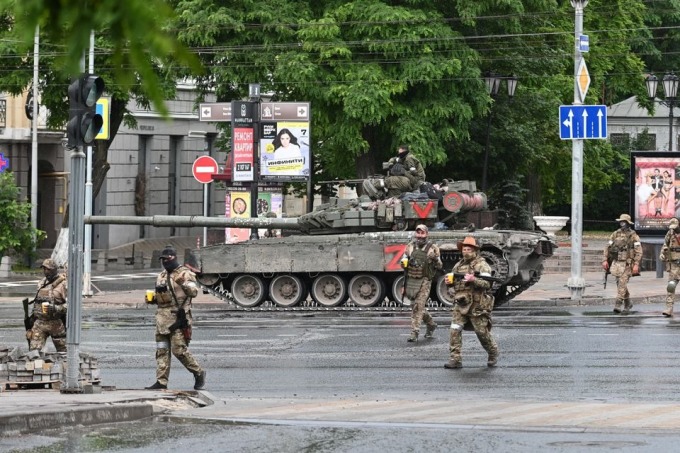The Wagner private military group is rebelling in Russia at a time when the global economy is still unstable due to the pandemic, war in Ukraine and inflation.
The Wagner riots on June 24 were considered the biggest crisis Russia has faced in decades. Russian officials reported no casualties. However, several homes and roads in the south were damaged. Officials in the city of Voronezh also reported a major fire at a local oil depot over the weekend, apparently caused by the Wagner riots.
On CNN , analysts assessed that this is the most serious challenge to Russian President Vladimir Putin in the past 23 years, which could cause many fluctuations and changes. In the past few years, Russia has not been in the top 10 largest economies in the world. However, they are still one of the largest energy suppliers to the world, especially to the Chinese and Indian markets, despite Western sanctions after the conflict in Ukraine early last year.
On June 24, energy powerhouse Qatar expressed “deep concern” about the situation in Russia. “The escalation of tensions in Russia and Ukraine will have a negative impact on international peace and security, especially on energy and food supplies,” Qatar’s Foreign Ministry said following news of the Wagner rebellion.
If energy supplies from Russia are severely disrupted, China and India could compete with the West for supplies elsewhere. If political upheaval disrupts exports of other commodities, such as grain or fertilizer, supply and demand could also be disrupted, pushing up prices.

Wagner soldiers on the streets of Rostov-on-Don (Russia) on June 24. Photo: Reuters
Richard Bronze, co-founder of Energy Aspects, said markets should analyze how high prices could rise if supplies from Russia were threatened. “Uncertainty would drive prices higher, as events like this could cause supply disruptions and fear,” he explained.
On Telegraph , Chris Weafer - Director of Macro-Advisory consulting firm on June 24 predicted that grain prices could increase by nearly 30% after Wagner's rebellion in Rostov city. Besides, more than 300 km south of Rostov is the city of Novorossiysk - which processes 3 million tons of oil exported each month to Russia and Central Asian countries.
Global energy and food prices spiked following the conflict in Ukraine early last year, especially in Europe and the United States. Prices have since cooled. However, the price war is far from over and is in its decisive phase.
“The final step in the campaign to restore price stability will be the most difficult,” the Bank for International Settlements (BIS) said in a report on June 15. The risk is that inflationary sentiment will persist, leading to what economists call a wage-price spiral.
"The global economy is at a critical turning point. Challenges need to be addressed," said BIS Director Agustin Carstens.
Global energy demand has weakened since the start of the year as economies slow. US crude has fallen nearly 14% this year, to below $70 a barrel, after peaking above $120 last year. Brent has also fallen.
Still, oil demand is forecast to hit a record high this year. Global policymakers, both in the West and in Asia, would have a headache if Russian energy supplies were disrupted. “If anything were to disrupt that supply, global oil prices would go up again, as we are entering a period where demand is forecast to exceed supply,” Bronze said.
Libya and Venezuela have both seen sharp declines in energy exports due to domestic political upheaval. Libya’s oil production fell by 1.7 million barrels a day to a record low of 365,000 barrels in 2020, according to the U.S. Energy Information Administration. Venezuela’s production also fell to a multi-decade low that year, according to an analysis by the Council on Foreign Relations (CFR).
Russia is much more important than the two countries above. Russia supplies 10% of global crude oil demand, producing nearly 10 million barrels a day. It is also the second largest oil exporter after Saudi Arabia in the OPEC+ alliance, with nearly 8 million barrels a day.
Western sanctions aimed to cut into Russia’s energy revenues. However, Russian oil exports have recovered to pre-war levels, as China and India replace Europe in buying Russian oil.
Bronze warned that it will take a long time for the Russian oil industry to recover after the collapse of the Soviet Union. “There were real problems with investment and stability,” he said. Now, while it’s too early to say whether the situation will change, “it raises a lot of questions about what happens next,” Bronze said.
Ha Thu (according to CNN, AFP)
Source link






























































































![[Infographic] In 2025, 47 products will achieve national OCOP](https://vphoto.vietnam.vn/thumb/402x226/vietnam/resource/IMAGE/2025/7/16/5d672398b0744db3ab920e05db8e5b7d)





Comment (0)